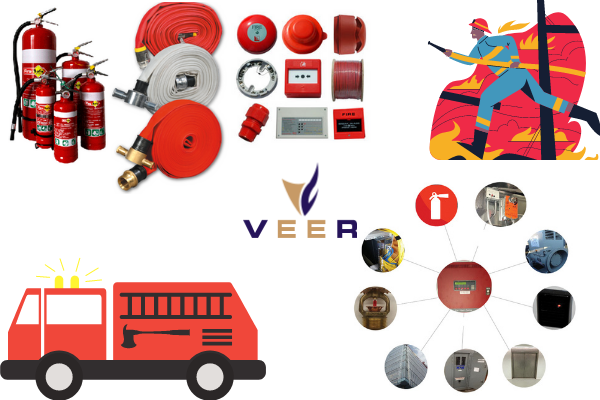Installing a comprehensive fire protection system is the very basics of a security infrastructure in an office. When it comes to commercial spaces like an office, it cans ave not just lives of your staff and visitors, but also minimise the damage to extremely critical equipment and information.
Today we have a wide selection in fire fighting equipment, from extinguishers, hoses to sprinklers. But it is important to note here that a fire protection system is not just about installing the right equipment. It also includes the training of your personnel. Without the right training your personnel will not know what to do in the event of a fire.
Find out the regulations
Each building has to follow the rules and regulations on fire safety laid down in the National Building Code is published by Bureau of Indian Standards. The objective of the code is to lay down a minimum standard of fire deterrence in a building to safeguard against any mishap. These are essential measures that must be taken in any building, whether residential, commercial or industrial.
The code classifies buildings constructions into four different categories and also lays down three types of fire zones. It is an exhaustive document that specifies standards for all construction elements like electrical installations, plumbing, safety sanitation, active and passive fire protection systems.
Other than this, some States may special regulations. Most of these are compliant with the National Building Code. But certain States like Maharashtra and Gujarat have some additional measures. Understand these before planning your system.
Take care of insurance
Despite the best fire protection, accidents can always happen. Our purpose is always to minimise the damage. We do this by preparing for the worst. This includes getting the right insurance in place. Insuring your business against fire will ensure that if such a calamity does occur, you can recover some of the damage.
In some businesses, insurance is essential, especially where fire hazard is high. This includes businesses that deal with flammable objects like fuel. There could be different fire protection schemes, depending on the business and scope. Do thorough research before deciding.
Get expert opinion
Some jobs are best left to experts and planning a fire protection infrastructure is one of them. A small business run from a couple of room can do with just a fire extinguisher. But for a larger business you may need a more elaborate fire protection systems. You need a careful evaluation of the premises to see how and which firefighting systems can you incorporate.
You should also get your water supply system evaluated. Permanent installations like sprinklers and hoses rely on the water supply and any snags will mean that your safety equipment will fail just when you need it. You need an expert to test the water supply, evaluate and understand it. There are a number of tests that have to be carried out. These include hydrant flow tests that check the water pressure and an evaluation of the pipes.
The water pressure has to be tested because sprinklers and hydrants need an optimum pressure to work effectively. Old building may also have corroded water pipes. These should be tested for passage.
Check all fire fighting options
There are a number of fire fighting options you can go for. These include wet pipe riser, dry pipe risers, sprinkler, fire extinguishers, hose reels, and fire safety gear like helmets and blankets. All these systems have their own pros and cons. Some of these are required to be installed as per the law.
The decision for the right firefighting system will also depend on the budget you have. If your business is run in a building already equipped with the minimal fire safety standards, your on-site installations have to decide as per your own priorities. Some minimal equipment is necessary even if you have systems like risers in place. At the very least, an extinguisher should be in place.
Training & maintenance
An important part of equipping your premises with tis equipment is to see that it all keeps working as it should. Two important parts of this are: training and maintenance. The staff must be trained and drills practiced regularly to ensure that they know what to do in the event of a fire. Maintenance of all fire protection systems has to be undertaken at regular intervals to see that all equipment is in perfect working order.



